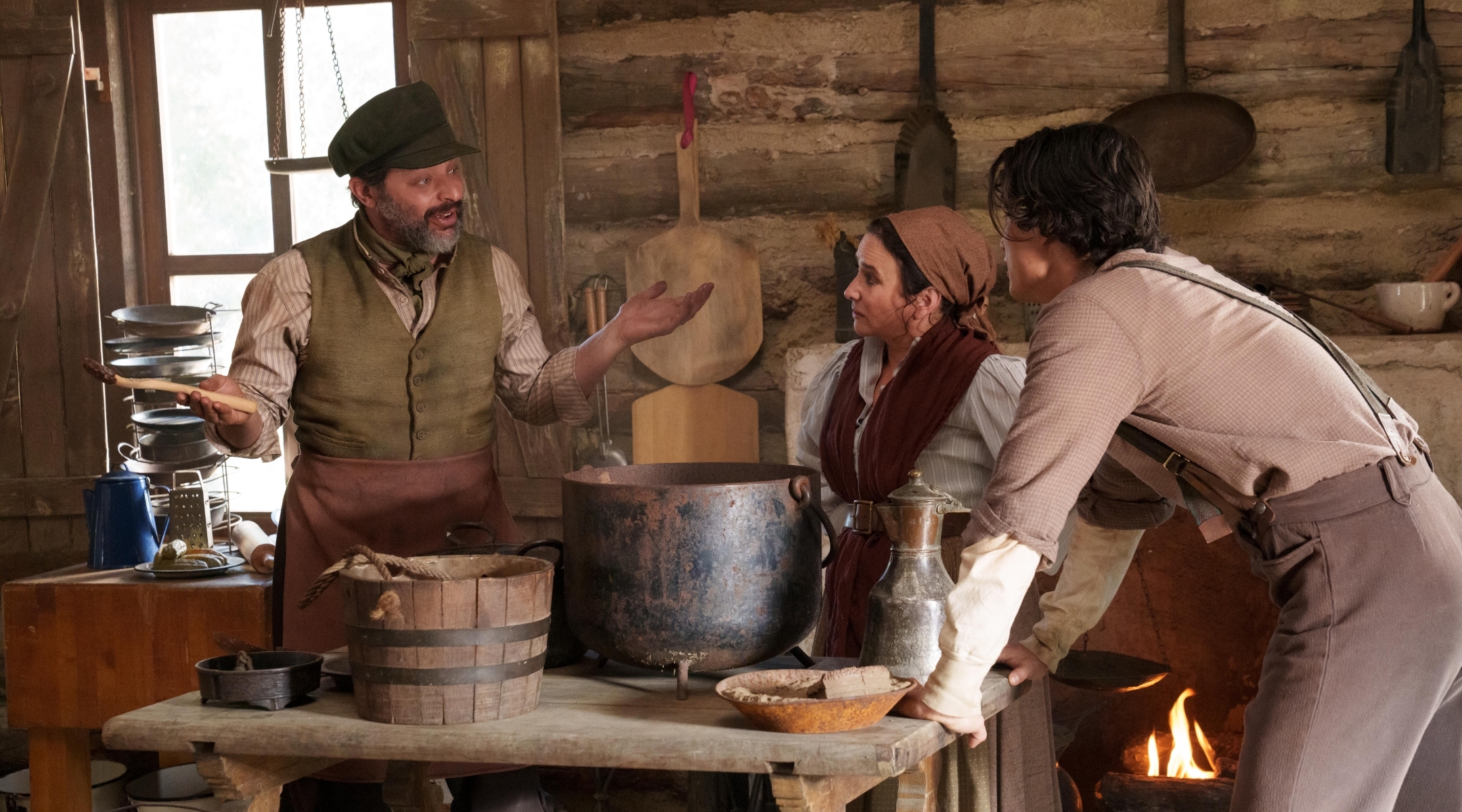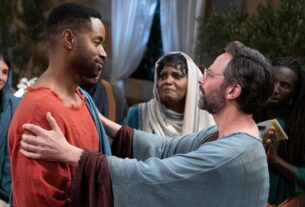Spoilers for “History of the World: Part II” follow.
(JTA) – Finally fulfilling the promise Mel Brooks made in 1981, the long-belated “History Of The World: Part II” brings us … “Hitler on Ice.”
For a sketch first teased during the end credits of Brooks’ film “History Of The World: Part I,” the leader of Nazi Germany can be seen attempting to land some difficult moves (perhaps a triple Axis?) at an Olympics-like skating competition.
Needless to stay, Hitler wasn’t known as a figure skater. But some aspects of the sketch — such as why collaborationist Vichy France would give the Nazi leader’s routine a perfect score — might benefit from a more detailed understanding of the real history that’s being pilloried.
The same goes for the sendups of Christianity, the Russian Revolution and Henry Kissinger — all historical events and figures depicted in the first episodes of the series, which landed on Hulu on Monday. Produced by Brooks and offering up its share of his Catskills-style Jewish humor, the eight-episode, four-night romp through history stops frequently on items of Jewish interest. Some sketches recur throughout the series.
So here is your guide to the real-life Jewish history of “History of the World: Part II,” to be updated daily as new episodes drop.
The Russian Revolution
In a longer narrative first introduced in Episode 1, the show’s depiction of the fall of the Russian Empire is a high-wire blend of parodies and stylistic influences, as well as a crash course on Russian antisemitism.
It begins with a grody depiction of early-1900s Jewish shtetl life borrowing heavily from “Fiddler on the Roof.” Mud-pie dealer and patriarch Shmuck Mudman, played by Jewish actor Nick Kroll, uses a truncated song-and-dance number (“Submission”) to encourage his feisty son to follow Jewish traditions and stay away from cosmopolitan life in Moscow. But his son is unconvinced: “The shtetl stinks, it’s no place for a Jew.” Like Anatevka, the tiny Jewish village from “Fiddler,” the Jews are heavily implied to be living in the “Pale of Settlement,” the only region of the Russian Empire where Jews were permitted to live starting in the early 19th century and lasting until the Russian Revolution in 1917. State-backed schooling and “Russianization” programs sought to erode Jewish communal identity and replace it with a Russian national identity; a small number of Jews were allowed to work or study beyond the Pale if they had special skills.
In “History,” the Mudmans, including a mother played by Jewish comic Pamela Adlon, are menaced by the Cossacks, the Ukrainian mercenaries and feared horsemen who carried out a series of pogroms agains the Jews often at the behest of the Russian state. Meanwhile, the gilded Romanov family are depicted as Kardashian-like beauty influencers headed up by Tsar Nicholas II (Danny DeVito), who discovers their empire is on the brink of collapse.
In real life, the Russian Revolution liberated the state’s Jewish population with the fall of the tsar in 1917, and a large percentage of Communist party members at the time were Jewish. (Like DeVito, Nicholas II in real life was a short man, around five-foot-six.) In the decades to follow, Communist rule would come to have a devastating effect on the Jews of the Soviet Union, suppressing their religion and culture, and purging many of the Jewish party members.
Hitler on ice
It’s hard to impress a team of international judges when you’re the genocidal maniac who tried to conquer them.
In the skit, Hitler is despondent when judges from the countries in which he waged war all give him zeroes — with the exception of Vichy France, which awards him a perfect score, and Poland, which awards him an expletive. (It’s an uneasy restaging of the line “Winter for Poland and France,” from “Springtime for Hitler,” the musical highlight in Brooks’ “The Producers.”)
The scores reflect Nazi Germany’s relationship with the countries: It conquered France and installed a puppet government that acquiesced to Hitler’s orders to round up and denationalize the country’s Jews. Meanwhile, the Nazis invaded Poland in 1939, dividing up its rule with the Soviets and murdering much of its Jewish population in the Holocaust. Unlike the French government, which signed an armistice with Germany after heavy losses to clear the path for Vichy rule while preserving the Republic in name, Poland does not acquiesce to a collaborationist narrative; decades later, it is illegal in Poland to suggest that the country was complicit in Nazi atrocities.
But these wartime victories make Hitler the loser of “Hitler on Ice.” Accompanied by his “coach” Joseph Goebbels (the Nazis’ propaganda minister) and partner Eva Braun, this Hitler hangs his head in shame as he trudges away to the jeers of the crowd, intending to go shoot himself in his Berlin bunker in a repeat of his actual death by suicide at the end of World War II.
“If you put concentration camps in people’s countries,” offers one of the sportscasters (played by Jewish comic Ike Barinholtz), “you better be flawless on the ice.”
Jesus (Jay Ellis) and Judas (Nick Kroll) in a scene from the “Curb Your Judaism” sketch in “History of the World” Part II.” (Aaron Epstein/Hulu)
The betrayal of Jesus Christ
Titled “Curb Your Judaism,” the show’s dramatization of the events following the Last Supper is styled in the manner of Larry David’s long-running HBO comedy “Curb Your Enthusiasm.” Kroll plays Judas like he’s Larry David, and his betrayal of Jesus is depicted as a series of comic misunderstandings — which, like the original “Curb,” often revolve around questions of Jewish identity. “Curb” regulars play supporting roles as disciples, with J.B. Smoove as Luke and Richard Kind as Peter.
Besides aping the “Curb” mannerisms, including Judas’ grumblings about foot-washing and the size of the portions at the Last Supper, much of the comedy of the Jesus segments revolves around to what degree Jesus himself (Jay Ellis of “Insecure”) has formally renounced his Judaism. The segment depicts how Christ endeared himself to his followers, and introduced Christianity, by relaxing many of the requirements of Jewish tradition, including kosher laws and circumcision. “Something’s off with this Jesus guy. He’s trying to phase out his Judaism,” Judas remarks.
Jewish scholars have generally viewed Jesus Christ as a teacher, but not as a prophet or messiah as Christians believe. Jews have granted differing levels of respect to Jesus depending on Jewish-Christian relations at any given point throughout world history (Jews weren’t such big fans of Jesus during the Spanish Inquisition, so memorably depicted in “Part I”).
Whether Jesus really did instruct his followers to disregard kosher laws and other Jewish practices is disputed by New Testament scholars and interpreters of the Gospel of Mark; other scholars believe Jesus intended to live as any other Jew. But “Curb Your Judaism” does depict Jesus as ultimately perishing at the hands of the Roman Empire, with whom Jews had a contentious relationship at the time, rather than at the hands of Jews, which was a popular belief used to justify antisemitism among various Christian denominations for centuries. “Nostra Aetate,” the influential 1965 papal decree, finally “absolved” the Jews for Christ’s murder, at least according to official Catholic doctrine.
Henry Kissinger
A sketch that imagines Shirley Chisholm, the first Black female member of Congress, as the star of a 1970s sitcom modeled on “The Jeffersons” includes a role for Kroll as Henry Kissinger, Richard Nixon’s Jewish secretary of state. (Kroll is also an executive producer on the entire series, which helps explain his regular onscreen appearances.)
Historians generally view Kissinger, a refugee from Nazi Germany, as the lead architect of the Nixon administration’s most controversial decisions, including prolonging the Vietnam War and orchestrating a secret bombing campaign on Cambodia. Some call him a war criminal.
The Kissinger of “History” catches some of that criticism. A throwaway line further suggests he is an immortal demon.
Check back in throughout the week as JTA brings you Jews in space… the history space, that is.




